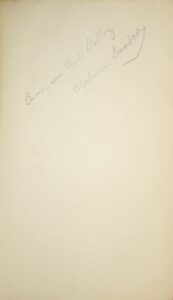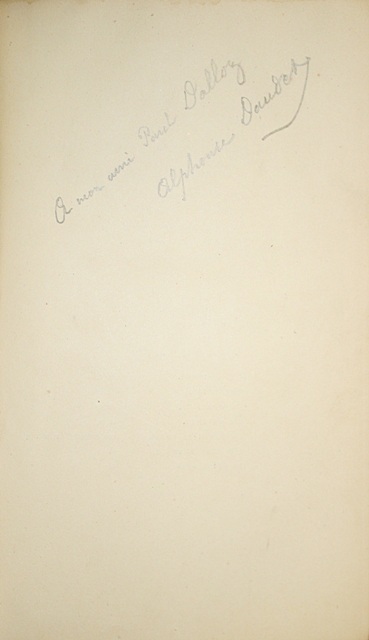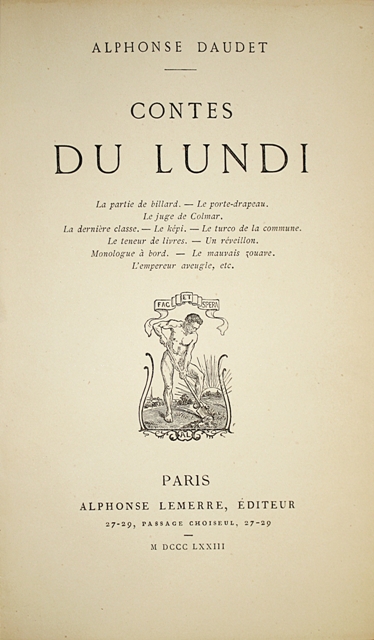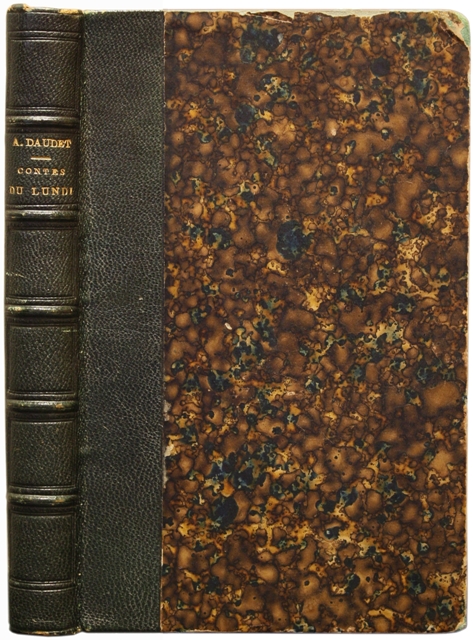DAUDET, Alphonse. Contes du lundi. Paris, Alphonse Lemerre, 1873.
12mo [180 x 115 mm] of (1) bl. l., (4) ll., 258 pp., (1) bl. l. Bound in green half-shagreen, spine ribbed and decorated with blind-stamped fillets, top edge gilt. Corners slightly rubbed. Contemporary binding.
First edition of this “very rare work of Alphonse Daudet containing 31 tales from the author’s best inspiration” (Carteret, I, 194). Clouzot, 81; Vicaire, III, 41; Rahir, La Bibliothèque de l’amateur, 391; Talvart, IV, 16.
Carteret mentions 4 copies on China not reported by Talvart.
“Remarkable work by Alphonse Daudet, published in 1873 and which, without making one forget the ‘Letters from my windmill’, made as much for the author’s glory as all his novels. This compilation contains around 40 tales, which, for most of them, recall the short and terrible war of 1870: the Invasion, the Siege of Paris and the Commune. Only things that he saw, in a way. Less realistic than impressionistic, Daudet takes pleasure in small pictures. No one knew, as he did, capture in a few pages a heart-rending, unfortunate or fully comical situation. He excels in bringing out the weak side of human beings. Yet, he’s careful not to judge: his taste for truth, his compassion, his imaginativeness forbid him any behavior of this kind. In this field, Daudet remains inimitable…These tales with a historical background are really of a good nature, as we used to say in former times. Daudet seems to have written them as the thoughts came into his head. It’s as if they were made all by themselves. Naturalness, freshness and simplicity: Daudet brings in his style the energy of the Provencal narrators. In addition, we like that, to so much pathos he associated such a feeling of discretion. Here is probably what explains the appeal that the ‘Contes’ have always had on many readers”. (Dictionnaire des Œuvres, II, 64).
A precious copy offered by the author to his bosom friend Paul Dalloz, with this signed dedication at the beginning of the volume: “To my friend Paul Dalloz. Alphonse Daudet”.
Paul Dalloz (1829-1887) belonged to the Dalloz family made of jurists and editors. He ran several newspapers including Le Monde illustré and Le Moniteur universel. He participated in many reviews and kept a correspondence with Charles Baudelaire. As Alphonse Daudet’s very close friend, he was the witness of the author at his wedding with Julia Allard in 1867. “Paul Dalloz’ life and conduct are a real testimony of the deep changes experienced by France in the second half of the 19th century. Director of ‘Le Moniteur’ in the time of Napoleon III, he frequents the Court, theaters and salons in vogue. With Théophile Gautier and Sainte-Beuve’s presence, who both used to write in his paper, he touched the world of arts, and was familiar with princess Mathilde’s salon. In 1867, Alphonse Daudet dedicated to him ‘Little Good-For-Nothing’, which probably indicates the closeness between the two men, and testifies the author’s affection and the dedicatee’s attention to the literary phenomenon of his time.” (J.-Y. Mollier, L’Argent et les lettres : le capitalisme d’édition).




